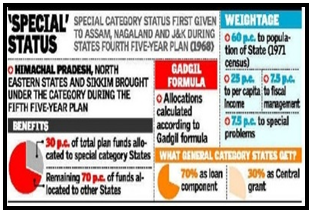SPECIAL CATEGORY STATUS
Why in the News?
- The Bihar Cabinet passed a resolution urging the Centre to grant the state a special category status.
- The move follows Chief Minister Nitish Kumar’s recent threat of launching a movement if the demand for special status remains unmet.
Source: Times of India
Significance of Special Category Status
- Geographical and Socio-economic Disadvantages: States facing challenges like international borders, hilly terrain, tribal populations, or economic backwardness are typically granted special category status.
- Higher Central Funding: Such states receive an increased share of Central funding to address developmental needs.
| Special Category States
· States with SCS receive benefits such as: o 90% central funding for centrally sponsored schemes. o Concessional loans from the Centre. o Relaxation in the criteria for availing of central assistance. · As of 2023, 11 states have SCS: Arunachal Pradesh, Assam, Himachal Pradesh,Telangana, Manipur, Meghalaya, Mizoram, Nagaland, Sikkim, Tripura, and Uttarakhand. · Special Category Status (SCS) differs from special status by focusing on economic and financial aspects, distinct from the latter, which involves heightened legislative and political rights. |
Chief Minister’s Rationale
- Welfare Measures for Poor Families: Chief Minister Nitish Kumar highlighted that special status would secure approximately ₹2.50 lakh crore over the next five years, aiding welfare schemes for around 94 lakh poor families.
- Caste Survey Findings: The demand aligns with the findings of a caste survey conducted by the Bihar government, justifying the need for special status.
Welfare Measures and Assistance
- Increased Quotas and Assistance: The state government raised caste-based job and education quotas to 65%, alongside providing financial assistance to families in poverty.
- Economic Activity Support: Plans include providing ₹2 lakh in instalments to one member of each eligible family for economic activities.
- Housing Initiatives: The government aims to provide permanent houses to about 39 lakh families currently living in huts.

 Source: Times of India
Source: Times of India


